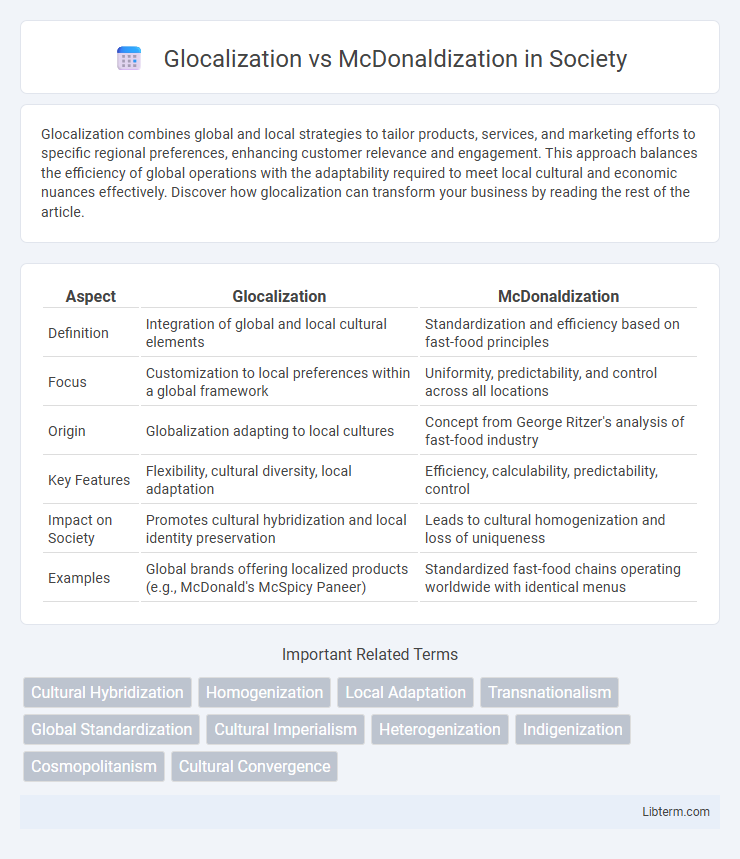Glocalization combines global and local strategies to tailor products, services, and marketing efforts to specific regional preferences, enhancing customer relevance and engagement. This approach balances the efficiency of global operations with the adaptability required to meet local cultural and economic nuances effectively. Discover how glocalization can transform your business by reading the rest of the article.
Table of Comparison
| Aspect | Glocalization | McDonaldization |
|---|---|---|
| Definition | Integration of global and local cultural elements | Standardization and efficiency based on fast-food principles |
| Focus | Customization to local preferences within a global framework | Uniformity, predictability, and control across all locations |
| Origin | Globalization adapting to local cultures | Concept from George Ritzer's analysis of fast-food industry |
| Key Features | Flexibility, cultural diversity, local adaptation | Efficiency, calculability, predictability, control |
| Impact on Society | Promotes cultural hybridization and local identity preservation | Leads to cultural homogenization and loss of uniqueness |
| Examples | Global brands offering localized products (e.g., McDonald's McSpicy Paneer) | Standardized fast-food chains operating worldwide with identical menus |
Understanding Glocalization: Definition and Key Concepts
Glocalization refers to the adaptation of global products or services to fit local cultures and preferences, blending global reach with local nuances. Key concepts include cultural sensitivity, customization, and the integration of global strategies with local needs to enhance relevance and acceptance. This approach contrasts with standardization, emphasizing flexibility and responsiveness in international business and marketing.
McDonaldization Explained: Core Features and Impact
McDonaldization refers to the process by which principles of the fast-food industry, such as efficiency, calculability, predictability, and control, dominate other sectors of society. These core features streamline operations, standardize products and services, and optimize customer experiences, often at the expense of creativity and individuality. The impact of McDonaldization extends to consumer culture, workplace practices, and social interactions, promoting uniformity and rationalization in global contexts.
Origins and Historical Context of Glocalization
Glocalization originated in the 1980s as a response to globalization's homogenizing effects, emphasizing the adaptation of global products and ideas to fit local cultures and markets. Unlike McDonaldization, a concept developed by sociologist George Ritzer in the 1990s highlighting the standardization and efficiency of global franchises, glocalization stresses cultural sensitivity and customization within global business strategies. This concept gained prominence through practices in multinational corporations that localized their offerings to resonate better with diverse consumer bases worldwide.
The Rise and Spread of McDonaldization in Society
The rise and spread of McDonaldization in society is characterized by the principles of efficiency, calculability, predictability, and control, transforming various sectors such as retail, education, and healthcare. This process emphasizes standardized practices and uniform experiences, often leading to homogenization and loss of cultural diversity. In contrast to glocalization, which adapts global products to local cultures, McDonaldization prioritizes uniformity and mass production, influencing consumer behavior and organizational structures worldwide.
Comparing Glocalization and McDonaldization: Key Differences
Glocalization emphasizes adapting global products and services to fit local cultures, enhancing relevance and acceptance by incorporating regional customs and preferences. McDonaldization refers to the process by which principles of fast-food restaurants, such as efficiency, calculability, predictability, and control, dominate other sectors of society, often leading to standardized and homogenized experiences worldwide. The key difference lies in glocalization's focus on cultural customization versus McDonaldization's emphasis on uniformity and systematization across diverse contexts.
The Role of Culture in Glocalization vs McDonaldization
Glocalization emphasizes the adaptation of global products and services to align with local cultural preferences, preserving unique traditions and consumer behaviors. McDonaldization standardizes experiences across diverse settings, prioritizing efficiency, predictability, and control, often at the expense of cultural specificity. This contrast highlights how glocalization respects cultural diversity while McDonaldization promotes homogenization in global markets.
Economic Effects of Glocalization and McDonaldization
Glocalization drives economic effects by adapting global products to local markets, enhancing consumer relevance and stimulating local entrepreneurship, which fosters economic diversity and resilience. McDonaldization promotes economic efficiency and standardization through uniform processes and mass production, leading to cost reductions and increased scalability but often at the expense of local cultural uniqueness and small businesses. Both phenomena impact economic landscapes by balancing global integration with local adaptation, influencing employment patterns, market competition, and consumer behavior worldwide.
Case Studies: Real-World Examples of Each Concept
Glocalization is exemplified by McDonald's adaptation of menu items like the McAloo Tikki in India, catering to local tastes while maintaining global brand identity. McDonaldization is demonstrated by the company's standardized processes, such as uniform service protocols and efficient kitchen operations, ensuring consistency across global outlets. These case studies highlight how glocalization fosters cultural customization, whereas McDonaldization emphasizes efficiency and control.
Criticisms and Challenges Facing Both Approaches
Glocalization faces criticism for potentially diluting local cultures by blending global and local elements, leading to cultural homogenization despite its intent to promote diversity. McDonaldization is challenged for prioritizing efficiency, predictability, calculability, and control at the expense of creativity, individuality, and authentic experiences, resulting in social dehumanization. Both approaches struggle with balancing globalization's economic benefits and the preservation of cultural identity, raising concerns about ethical implications and long-term sustainability.
The Future of Globalization: Glocalization or McDonaldization?
Glocalization emphasizes adapting global products and services to local cultures, ensuring relevance and sustainability in diverse markets, while McDonaldization drives standardization, efficiency, and uniformity across global operations. The future of globalization likely hinges on balancing these approaches, where companies combine the scalability of McDonaldization with the cultural sensitivity and customization central to glocalization. Emerging trends in consumer demand for authenticity and local engagement suggest glocalization will become increasingly vital for long-term global success.
Glocalization Infographic

 libterm.com
libterm.com